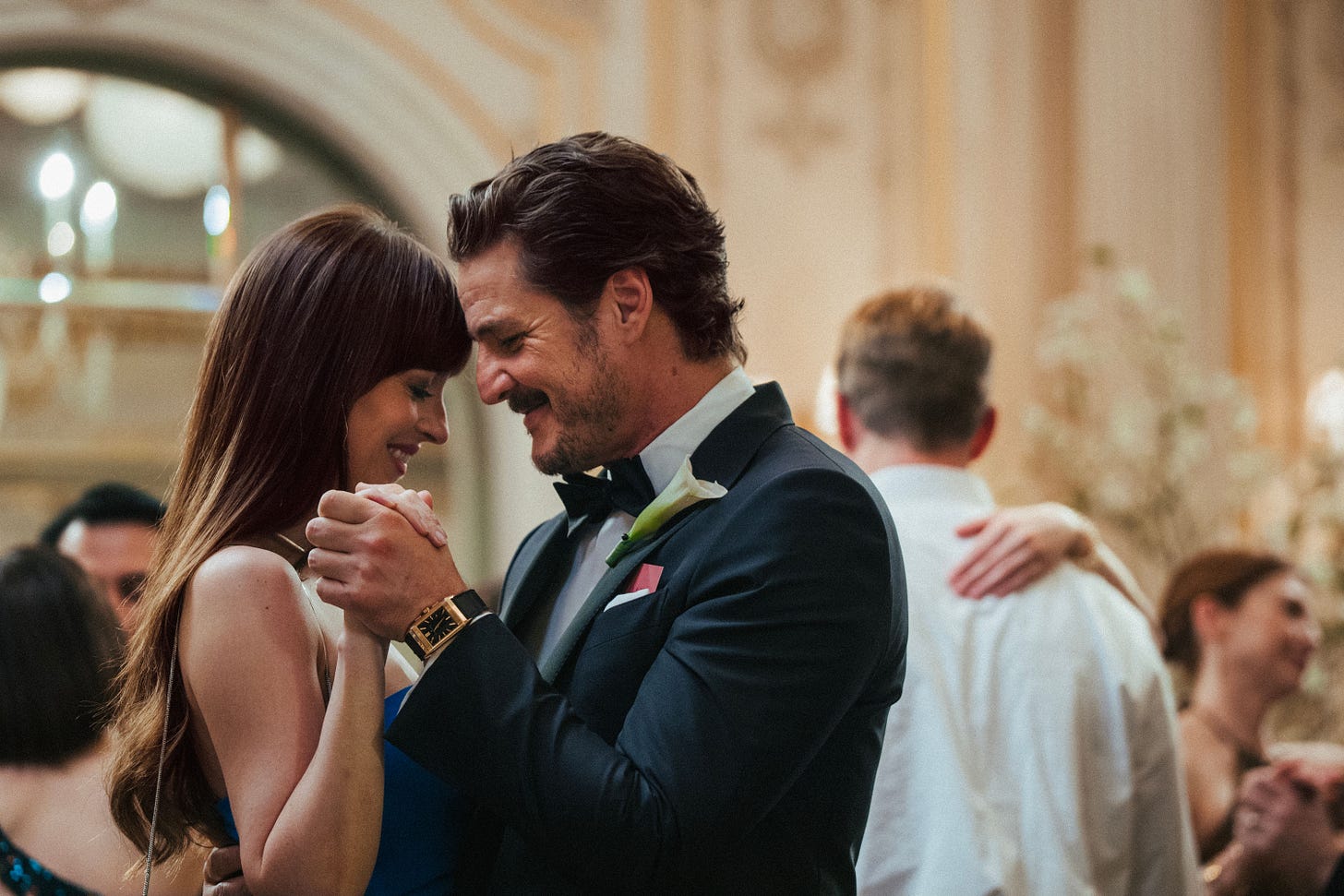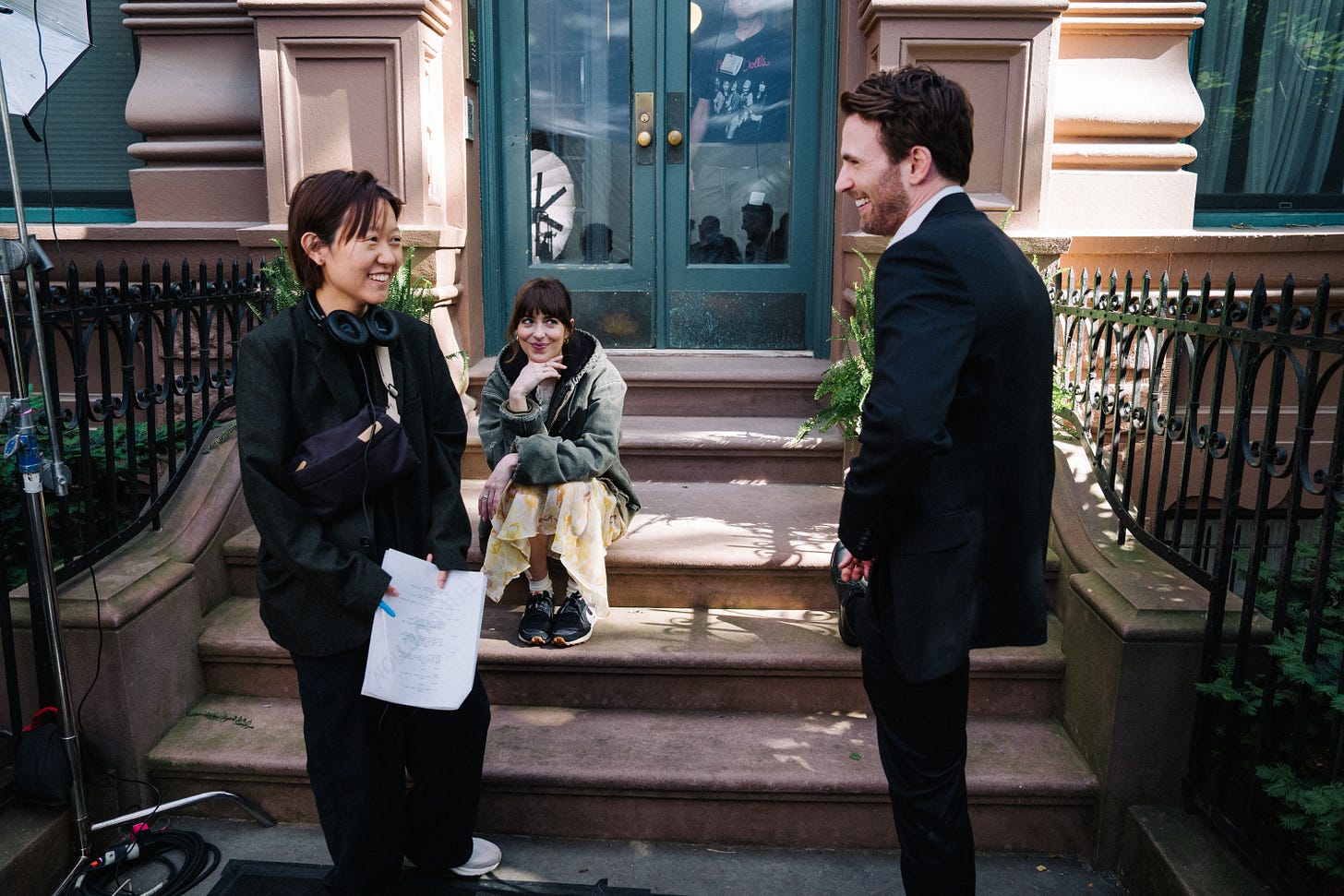
Love triangles are a trite storytelling device. Even in movies and shows I otherwise like, the choice to set up the central conflict as a love triangle often makes me roll my eyes. It's funny in retrospect because this is a movie I now adore, but it took me a few years to warm to "Broadcast News," which, if distilled down to very reductive and uncharitable terms, is about two mediocre dudes fighting over a woman (again, emphasis on "reductive" and "uncharitable"). By my early 20s, I came to appreciate that the love triangle is not really the point of the movie at all, but a stand-in for deeper ideas and competing philosophies.
So I had a hunch that writer-director Celine Song's new movie "Materialists" was not what it seems. The initial wave of glossy marketing focused heavily on its three leads, while also noting — in smaller font — that it's from the Oscar-nominated writer-director of "Past Lives" (which, let's be clear, should be the biggest selling point). I thought: No way is the same person who made "Past Lives" making a conventional rom-com! In response to one of the film's promotional posters, a friend of mine texted me something to the effect of: "There's gotta be something else here, right?"
In Celine Song we trust. As I suspected, it's a movie with a lot of hidden depths, peeling away layer after layer and revealing a-ha moment after a-ha moment about the collision of romance and capitalism, marriage as a marketplace and an industrial complex, and millennial malaise.
The basic plot is not important, but just to get it out of the way: at a wedding of one of her clients, matchmaker Lucy (Dakota Johnson) meets the groom's brother Harry (man of the moment Pedro Pascal, whose casting is doing a lot of work here — I mean this with the highest of compliments). She also encounters an old flame: broke cater-waiter John (Chris Evans). But very quickly, Song establishes that this is not what the movie is really about.
Last week, the Instagram algorithm served me a clip of Johnson promoting the film on "Late Night with Seth Meyers." In it, Meyers muses that "Materialists" is less of a rom-com and more of a "rom-com-dram" or a "rom-dram-com." Johnson agrees the movie is "super 'dram'… like a 'rom-dramedy,'" citing the obligatory Nora Ephron classics and of course, "Broadcast News," plus the more recent (and very good) "The Worst Person in the World." It's a funny bit, but I'd propose a different taxonomy. The following is not an exact science and certainly not mutually exclusive, but some movies are plot movies, some are vibes movies — and to me, "Materialists" is the best kind: an ideas movie (with some vibes, and mostly not a plot movie).
Throughout the film's dialogue, Song cleverly plays with the language of capitalism, reminding us that as much as we'd like to pretend modern marriage is no longer purely an economic proposition — well, it still is. Sometimes the cost is literal, like when Lucy's client gets cold feet at the altar and tearfully exclaims: "We spent hundreds of thousands of dollars on this wedding so that I could feel like a fucking woman!"
As a matchmaker, Lucy asserts that "marriage is a business deal," all about cold, hard numbers — how tall are they? how much do they make? — adding up to each client's value in the romance marketplace. In explaining her job to Harry, Lucy equates it to "working at the morgue or an insurance company," appraising people for the quantifiable value of their parts. Harry, who comes from a family of financiers, gets it. Later in the film, one of Lucy's clients bitterly bemoans she was treated as "worthless merchandise to pawn off on anyone who would take it."

There are several events in the film's second half that dramatically change its tenor (one of which involves that piece of dialogue), leaning into the "dram" of the "rom-com-dram." This is where those hidden depths really reveal themselves. The film's central love triangle isn't as basic as it seems — Harry especially complicates both Lucy's tried-and-true formula as a matchmaker, as well as the audience's expectations. And Lucy has a crisis of confidence, wondering whether matchmaking is really just a form of selling out, as she packages her clients as artificially inflated commodities.
At times, "Materialists" seems to be at war with itself, as if Song, through the film and her protagonist, is trying to figure out where she falls on the spectrum of optimism vs. cynicism, idealized romance vs. brass-tacks business. I kept wondering: How is she going to end this thing? The latter half is also where the film occasionally feels tonally off. Similarly, the capitalism metaphors get a little too heavy-handed and risk veering into one of my pet peeves: when a character basically states the thesis statement of the film. And without spoiling it, I don't think she quite sticks the landing.
But most of this is splitting hairs. It's satisfying when someone who made something extremely lauded manages to make something new that subverts expectations. While "Materialists" isn't as fully formed as "Past Lives" (high bar, I know), what's more important is that it's distinctly different. However, they do share some broad similarities, which isn't a bad thing. If Song wants to make five more stylish New York movies about the complications of modern love, I'd be a very happy customer. (There's actually a subtle "Past Lives" Easter egg tucked into "Materialists," yet another a-ha moment I reveled in.)
Plenty of movies have to fit themselves into a box for marketing purposes. Maybe it's fitting that a cerebral movie that's a meditation on romance clashing with late-stage capitalism has to be packaged as a conventional rom-com. But unlike Lucy having to sell her clients a bill of goods, "Materialists" is a much more worthwhile transaction.
Odds & ends:
After I wrote this, A24 posted a list of Song’s cinematic influences for this movie. Not surprised at what’s listed at the top (ha!) + the several Jane Austen adaptations + the Merchant Ivory.
Relatedly, I enjoyed her interview with Anna Sale on the podcast “Death, Sex, & Money,” talking about how "Materialists" was inspired by her brief stint as a matchmaker, a side gig when she was a broke playwright; and on how to discuss money with friends and lovers.
Are matchmakers having a moment? See also: Seema's unsuccessful encounter with a matchmaker on a recent episode of "And Just Like That…" I am still slogging through that silly show, mostly for the ~ cultural discourse ~ (and of course, for Sarita Choudhury). If you'd like to form an AJLT support group, I am here for you.
Speaking of millennial malaise: this was an interesting piece at Vox on how millennials can't even afford to have the traditional midlife crisis (I also chuckled at the headline, roasting us millennials for frequently ending our texts with "lol," which is unfortunately true, lol. To enhance the "lol," I recommend 🫠, or 🙃, or 🥴.)
Thanks for reading and for being here. Also, a very happy Father's Day to all the fathers and father figures reading this — including and especially my dad.
If you catch "Materialists" in the coming weeks, let me know what you think — would love to discuss the second half without having to talk around spoilers. This newsletter tends to be more “dram” than “com.”



